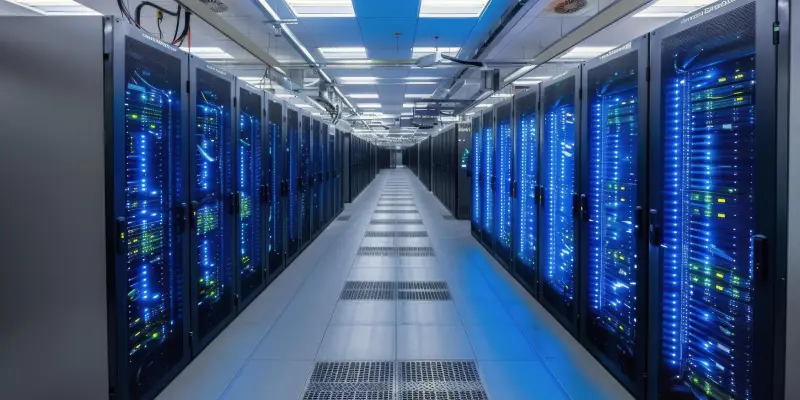In response to the burgeoning demand for computational power driven by sophisticated AI applications and high-performance computing, Nvidia has unveiled a cutting-edge solution that promises to revolutionize data center cooling systems. As server racks become increasingly dense and energy-hungry, traditional air-based cooling systems struggle to keep pace, underscoring the need for more efficient alternatives. Nvidia’s introduction of liquid-cooled systems marks a significant leap forward in addressing these energy and cooling challenges. This innovation is exemplified by the company’s GB200 NVL72 and GB300 NVL72 systems, which require unprecedented power levels of 120 to 140 kilowatts per rack. Such requirements far exceed the capabilities of conventional data setups.
The Mechanics and Advantages of Liquid Cooling
Nvidia’s response to these mounting demands is a pioneering direct-to-chip liquid cooling system that radically differs from outdated air cooling techniques. Rather than relying on air circulation, this method involves coolant circulating through cold plates affixed to the hottest components, such as CPUs and GPUs. By implementing this approach, data centers can manage denser configurations without the threat of overheating. This system is remarkably efficient, not only in energy consumption—up to 25 times more efficient than previous methods—but also in water conservation, being 300 times more water-efficient. The closed-loop liquid system eliminates evaporative loss, optimizing meticulous resource management.
The operational advantages of Nvidia’s liquid-cooled racks are substantial. These systems utilize Coolant Distribution Units (CDUs), engineered by partners like CoolIT and Motivair, managing up to two megawatts of cooling capacity. Such capabilities are crucial to supporting the high thermal output these advanced systems produce. Furthermore, the method emphasizes warm water cooling, substantially reducing reliance on mechanical chillers, thereby cutting down on both energy and water consumption. This approach not only enhances sustainability but also aligns with growing industry emphasis on reducing carbon footprints.
Navigating Challenges in Liquid Cooling Implementation
While the benefits of liquid cooling are evident, transitioning from traditional air-based systems involves overcoming specific infrastructural and maintenance-related challenges. Traditional data centers usually prioritize modularity and seamless service; however, liquid cooling complexities disrupt these conventional norms. Fully sealed systems, essential to preventing leaks, can complicate maintenance since accessing components poses a higher risk of malfunctions. Nvidia mitigates these concerns through innovative hardware features such as quick-disconnect fittings with dripless seals, efficiently balancing the dual needs of serviceability and leak prevention. The shift to liquid cooling necessitates substantial initial investments in redesigning and modifying facilities. Despite the considerable upfront costs, the long-term performance enhancements and efficiency gains prompt operators to consider undergoing such upgrades. Nvidia’s collaboration with Schneider Electric aims to ease this transition, providing reference architectures that streamline the deployment of high-density systems. By integrating CDUs and advanced thermal management strategies, these practices equip data centers to adapt swiftly and efficiently to evolving demands, ultimately proving cost-effective in the face of rapid technological advancements.
Toward a Sustainable and Efficient Future
In response to increasing demand for computational power driven by advanced AI applications and high-performance computing needs, Nvidia has introduced a groundbreaking solution that stands to transform cooling systems in data centers. With server racks growing ever denser and consuming large amounts of energy, traditional cooling systems utilizing air methods struggle to maintain efficiency, highlighting the urgency for more effective alternatives. Nvidia’s launch of liquid-cooled systems marks substantial progress in tackling these cooling and energy consumption challenges. The company’s innovative systems, namely the GB200 NVL72 and GB300 NVL72, showcase this advancement, requiring immense power levels between 120 to 140 kilowatts per rack—a demand that surpasses what conventional data center setups can handle. Such innovation underscores the need for reevaluating current data center infrastructures, driving the industry towards embracing these more efficient and powerful cooling methods.

